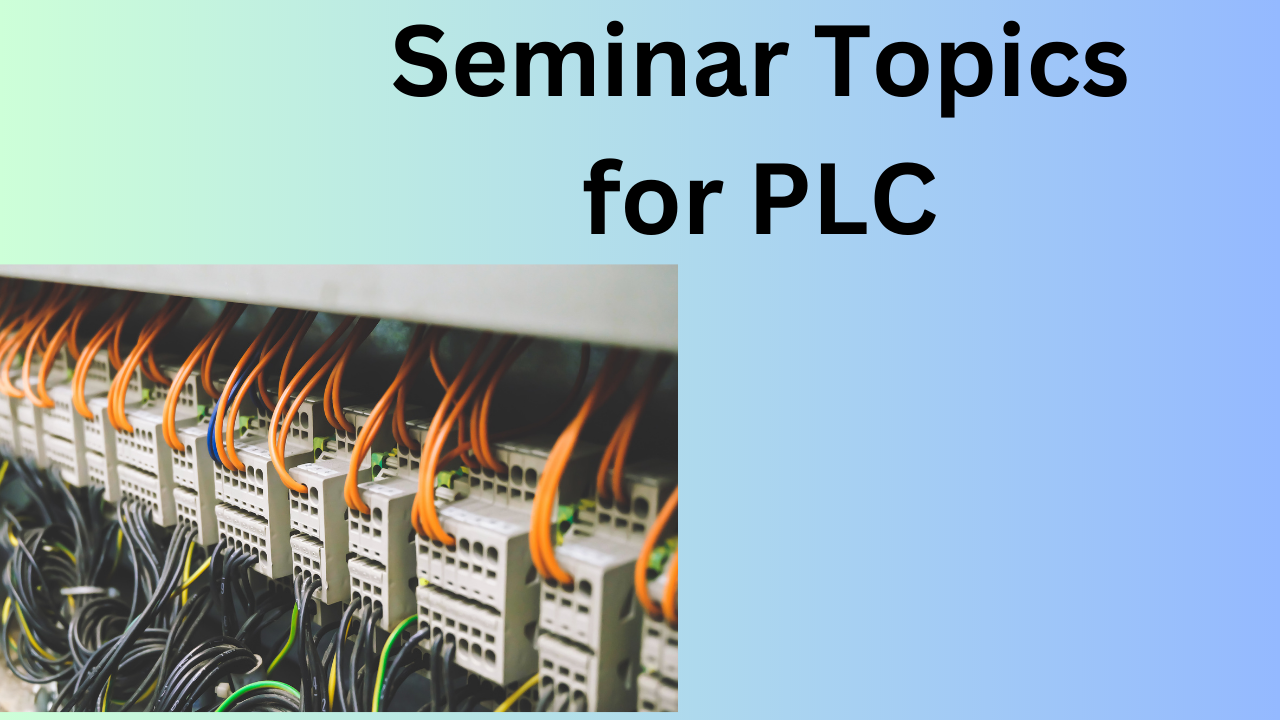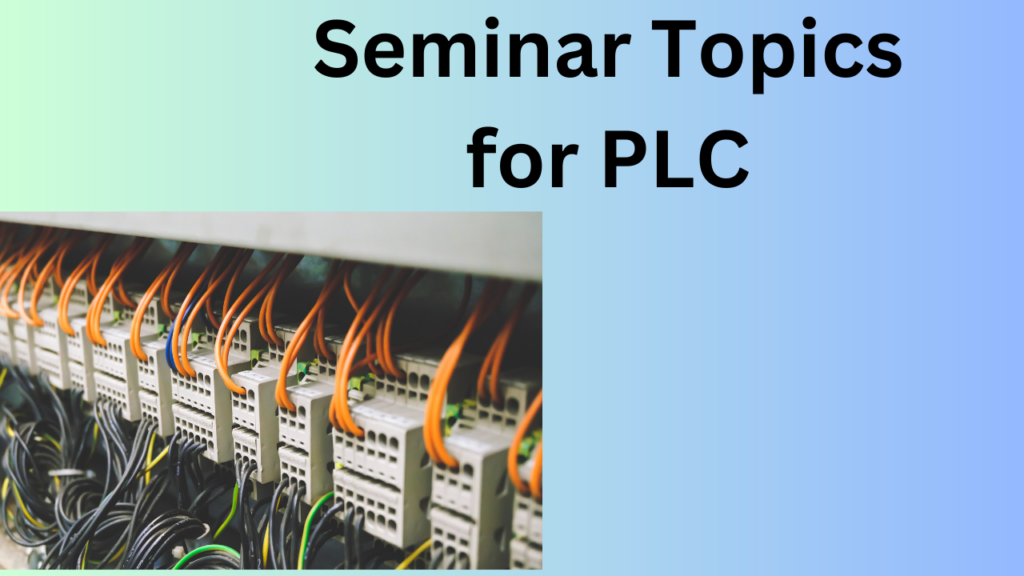
Seminar Topics for PLC 2023, each and every topic are covered. Plc Programmable Logic Controllers. A PLC stands for a Programmable Logic Controller. These industrial computers control different electro-mechanical processes in manufacturing, plants, or other automation environments. PLCs vary in size and form factors.
135 Seminar Topics for robotics 2023
In this section, we will provide a brief introduction to PLC, explaining its role in industrial automation and control systems. We will discuss the basic components of a PLC and its functions in controlling various processes.
Contents
- 1 Importance of Seminars in PLC
- 2 Emerging Trends in PLC Technology
- 3 Application of PLC in Industrial Automation
- 4 PLC Programming Languages
- 5 PLC Hardware and Architecture
- 6 PLC Communication Protocols
- 7 PLC Troubleshooting and Maintenance
- 8 PLC Security and Cybersecurity
- 9 PLC and Internet of Things (IoT)
- 10 PLC in Energy Management Systems
- 11 12. PLC in Robotics and Mechatronics
- 12 PLC in Building Automation Systems
- 13 PLC in Process Control Systems
- 14 PLC in Water Treatment Plants
- 15 Seminar Topics for PLC 2023
- 16 Conclusion
- 17 FAQs
Importance of Seminars in PLC
Seminars play a crucial role in disseminating knowledge and fostering learning in the field of PLC. This section will highlight the significance of attending seminars, including the opportunity to gain insights from industry experts, explore new technologies, and network with professionals.
Emerging Trends in PLC Technology
PLC technology is continuously evolving, and it is essential to stay updated with the latest trends. In this section, we will discuss emerging trends in PLC, such as cloud-based PLC programming, edge computing, artificial intelligence integration, and predictive maintenance.
Application of PLC in Industrial Automation
PLC finds extensive applications in industrial automation across various sectors. This section will explore the diverse range of industries where PLC is used, including manufacturing, oil and gas, automotive, pharmaceuticals, and food processing. We will discuss real-world examples to illustrate the importance of PLC in these industries.
PLC Programming Languages
PLC programming languages are used to develop logic and control algorithms for PLCs. This section will provide an overview of popular programming languages such as ladder logic, structured text, function block diagram, and sequential function chart. We will discuss their features, advantages, and application scenarios.
PLC Hardware and Architecture
Understanding the hardware components and architecture of PLC is crucial for effective implementation. In this section, we will discuss the various elements of PLC hardware, including the processor, input/output modules, memory, and communication interfaces. We will also explore different PLC architectures, such as centralized and distributed control systems.
PLC Communication Protocols
PLC communication protocols enable data exchange between PLCs and other devices or systems. This section will cover common communication protocols used in the industry, such as Modbus, Profibus, Ethernet/IP, and DeviceNet. We will explain their working principles and discuss their advantages and limitations.
PLC Troubleshooting and Maintenance
Maintaining and troubleshooting PLC systems is essential to ensure smooth operations. This section will provide practical insights into PLC troubleshooting techniques, including analyzing error codes, checking hardware connections, and using diagnostic tools. We will also discuss best practices for regular maintenance to enhance the lifespan and performance of PLC systems.
PLC Security and Cybersecurity
With the increasing integration of PLC systems into networked environments, security and cybersecurity become critical concerns. This section will focus on the challenges associated with PLC security and the measures to protect PLC systems from cyber threats. We will discuss topics such as access control, network segmentation, encryption, and intrusion detection.
PLC and Internet of Things (IoT)
The convergence of PLC and IoT opens up new possibilities in industrial automation. This section will explore how PLC systems can be integrated with IoT technologies to enable data-driven decision-making, remote monitoring, predictive maintenance, and optimization of industrial processes.
PLC in Energy Management Systems
Energy management is a significant aspect of sustainable industrial practices. In this section, we will discuss the role of PLC in energy management systems, including load monitoring, demand response, energy efficiency optimization, and renewable energy integration. We will highlight case studies that demonstrate the successful implementation of PLC in energy management.
12. PLC in Robotics and Mechatronics
PLC plays a vital role in controlling and coordinating robotic systems and mechatronic devices. This section will explore the application of PLC in robotics and mechatronics, including topics like motion control, sensor integration, robotic programming, and collaborative robotics. We will discuss the advantages of using PLC in these fields.
PLC in Building Automation Systems
Building automation systems rely on PLC for efficient control of HVAC (Heating, Ventilation, and Air Conditioning), lighting, security, and other building services. This section will discuss how PLC is utilized in building automation systems to improve energy efficiency, occupant comfort, and overall operational performance.
PLC in Process Control Systems
Process control systems depend on PLC for precise monitoring and control of industrial processes. This section will delve into the application of PLC in process control, including topics like feedback control loops, PID (Proportional-Integral-Derivative) control, batch processing, and alarm management. We will discuss the benefits of using PLC in process industries.
PLC in Water Treatment Plants
Water treatment plants require reliable and efficient control systems to ensure the delivery of clean and safe water. This section will explore the role of PLC in water treatment processes, including topics like flow control, level monitoring, chemical dosing, and remote monitoring. We will showcase successful implementations of PLC in water treatment plants.
Seminar Topics for PLC 2023

Introduction to Programmable Logic Controllers (PLCs)
PLC Programming Languages
PLC Hardware and Architecture
PLC Inputs and Outputs (I/Os)
PLC Communication Protocols
PLC Ladder Logic Programming
PLC Function Block Diagram Programming
PLC Sequential Function Chart Programming
PLC Structured Text Programming
PLC Instruction List Programming
PLC Programming with Motion Control
PLC Programming with PID Control
PLC Programming with HMI (Human Machine Interface)
PLC Programming with SCADA (Supervisory Control and Data Acquisition)
PLC Programming with DCS (Distributed Control System)
PLC Programming with OPC (Open Platform Communications)
PLC Programming with Industrial Networks (PROFINET, Ethernet/IP, etc.)
PLC Programming with Safety Controllers (SIL)
PLC Programming with Industrial Robots
PLC Programming with Vision Systems
PLC Programming with RFID (Radio Frequency Identification)
PLC Programming with Bar Code Scanners
PLC Programming with Laser Sensors
PLC Programming with Ultrasonic Sensors
PLC Programming with Proximity Sensors
PLC Programming with Temperature Sensors
PLC Programming with Pressure Sensors
PLC Programming with Flow Sensors
PLC Programming with Level Sensors
PLC Programming with Load Cells
PLC Programming with Solenoid Valves
PLC Programming with Motor Control
PLC Programming with Servo Control
PLC Programming with Stepper Control
PLC Programming with VFD (Variable Frequency Drive)
PLC Programming with Soft Starters
PLC Programming with Electrical Protection Devices
PLC Programming with Fuse Monitoring
PLC Programming with Circuit Breaker Monitoring
PLC Programming with Contactors
PLC Programming with Relays
PLC Programming with Timers
PLC Programming with Counters
PLC Programming with Data Logging
PLC Programming with Alarming and Notification Systems
PLC Programming with Redundancy and Fault Tolerance
PLC Programming with High Availability Systems
PLC Programming with Cybersecurity
PLC Programming with Wireless Connectivity
PLC Programming with Battery Management Systems.
PLC Programming with Renewable Energy Systems
PLC Programming with Energy Storage Systems
PLC Programming with Electric Vehicle Charging Stations
PLC Programming with Distributed Energy Resources
PLC Programming with Microgrids
PLC Programming with Smart Grids
PLC Programming with Power Quality Monitoring
PLC Programming with Power Factor Correction
PLC Programming with Power Electronics
PLC Programming with Switchgear Control
PLC Programming with Load Shedding
PLC Programming with Load Balancing
PLC Programming with Energy Management Systems
PLC Programming with Building Automation
PLC Programming with HVAC (Heating, Ventilation, and Air Conditioning)
PLC Programming with Lighting Control
PLC Programming with Fire Alarm Systems
PLC Programming with Access Control Systems
PLC Programming with CCTV (Closed Circuit Television) Systems
PLC Programming with Public Address Systems
PLC Programming with Elevator Control Systems
PLC Programming with Escalator Control Systems
PLC Programming with Conveyor Control Systems
PLC Programming with Material Handling Systems
PLC Programming with Industrial Crane Control Systems
PLC Programming with Water Treatment Systems
PLC Programming with Wastewater Treatment Systems
PLC Programming with Oil and Gas Processing Plants
PLC Programming with Chemical Plants
PLC Programming with Pharmaceutical Manufacturing
PLC Programming with Food and Beverage Manufacturing
PLC Programming with Dairy
PLC Programming with Brewery Automation
PLC Programming with Packaging Machines
PLC Programming with Material Testing Machines
PLC Programming with CNC (Computer Numerical Control) Machines
PLC Programming with Robotics and Automation
PLC Programming with 3D Printing Machines
PLC Programming with Automated Guided Vehicles (AGVs)
PLC Programming with Autonomous Mobile Robots (AMRs)
PLC Programming with Collaborative Robots (Cobots)
PLC Programming with Augmented Reality (AR) and Virtual Reality (VR) in Manufacturing
PLC Programming with Digital Twins in Manufacturing
PLC Programming with Predictive Maintenance Systems
PLC Programming with Condition Monitoring Systems
PLC Programming with Asset Management Systems
PLC Programming with Inventory Management Systems
PLC Programming with Supply Chain Management Systems
PLC Programming with Quality Control Systems
PLC Programming with Statistical Process Control (SPC) Systems
PLC Programming with Six Sigma
PLC Programming with Lean Manufacturing
PLC Programming with Agile Manufacturing
PLC Programming with Flexible Manufacturing
PLC Programming with Mass Customization
PLC Programming with Industry 4.0
PLC Programming with Digital Transformation
PLC Programming with Cloud Computing in Manufacturing
PLC Programming with Big Data Analytics in Manufacturing
PLC Programming with Artificial Intelligence in Manufacturing
PLC Programming with Machine Learning in Manufacturing
PLC Programming with Deep Learning in Manufacturing
PLC Programming with Natural Language Processing in Manufacturing
PLC Programming with Computer Vision in Manufacturing
PLC Programming with Edge Computing in Manufacturing
PLC Programming with Fog Computing in Manufacturing
PLC Programming with Blockchain in Manufacturing
PLC Programming with Cyber-Physical Systems in Manufacturing
PLC Programming with Digital Manufacturing
PLC Programming with Smart Manufacturing Systems.
PLC Programming with Robotics in Manufacturing
PLC Programming with Industrial Automation in Manufacturing
PLC Programming with Human-Robot Interaction
PLC Programming with Human-Machine Interaction
PLC Programming with Wearable Technologies in Manufacturing
PLC Programming with Collaborative Manufacturing
PLC Programming with Cloud Robotics in Manufacturing
PLC Programming with Digital Assistants in Manufacturing
PLC Programming with Generative Design in Manufacturing
PLC Programming with Additive Manufacturing in Manufacturing
PLC Programming with Hybrid Manufacturing in Manufacturing
PLC Programming with Sustainable Manufacturing in Manufacturing
PLC Programming with Circular Manufacturing in Manufacturing
PLC Programming with Green Manufacturing in Manufacturing
PLC Programming with Lean and Green Manufacturing in Manufacturing
PLC Programming with Cleaner Production in Manufacturing
PLC Programming with Life Cycle Assessment in Manufacturing
PLC Programming with Environmental Management Systems in Manufacturing
PLC Programming with Corporate Social Responsibility in Manufacturing
PLC Programming with Occupational Health and Safety in Manufacturing.
500 Seminar Topics for CSE Computer Science Engineering
Conclusion
In conclusion, attending seminars on PLC is vital for individuals involved in industrial automation and control systems. The topics covered in this article provide a broad overview of the areas that can be explored in such seminars. By staying updated with the latest trends, technologies, and applications of PLC, professionals and students can enhance their knowledge and contribute to the advancement of the field.
FAQs
Are seminars on PLC only for professionals?
No, seminars on PLC are beneficial for both professionals and students interested in industrial automation.
Can I attend seminars on PLC online?
Yes, many organizations offer online seminars and webinars on PLC topics.
How can I find relevant seminars on PLC?
You can search online platforms, industry websites, and professional networks to find upcoming seminars on PLC.
Are there any prerequisites for attending PLC seminars?
Prerequisites may vary depending on the seminar. Some may require basic knowledge of PLC concepts, while others are open to beginners.
Can attending seminars on PLC help in career advancement?
Yes, staying updated with the latest developments in PLC through seminars can enhance your skills and career prospects in the field.
1 thought on “Seminar Topics for PLC 2023”